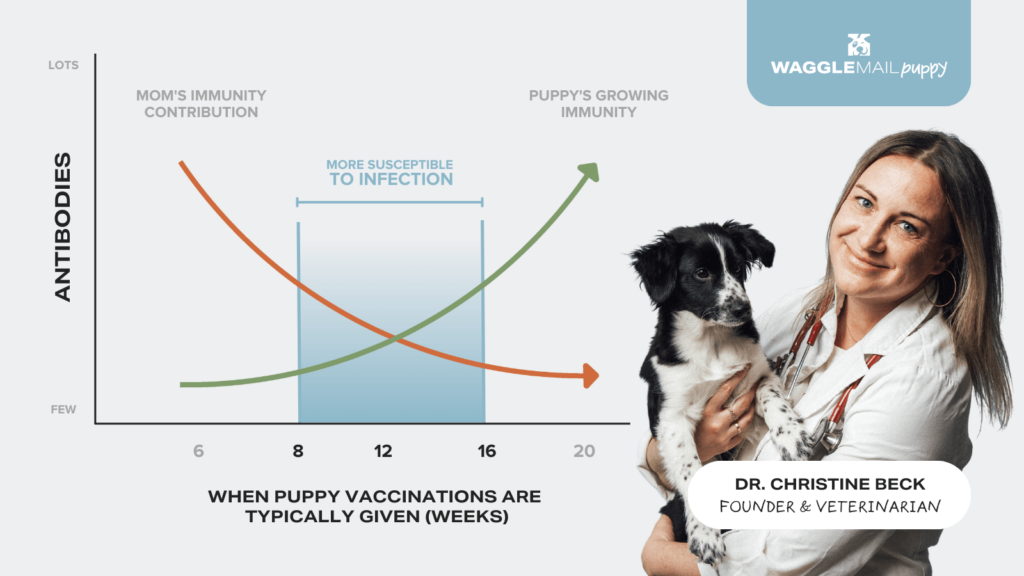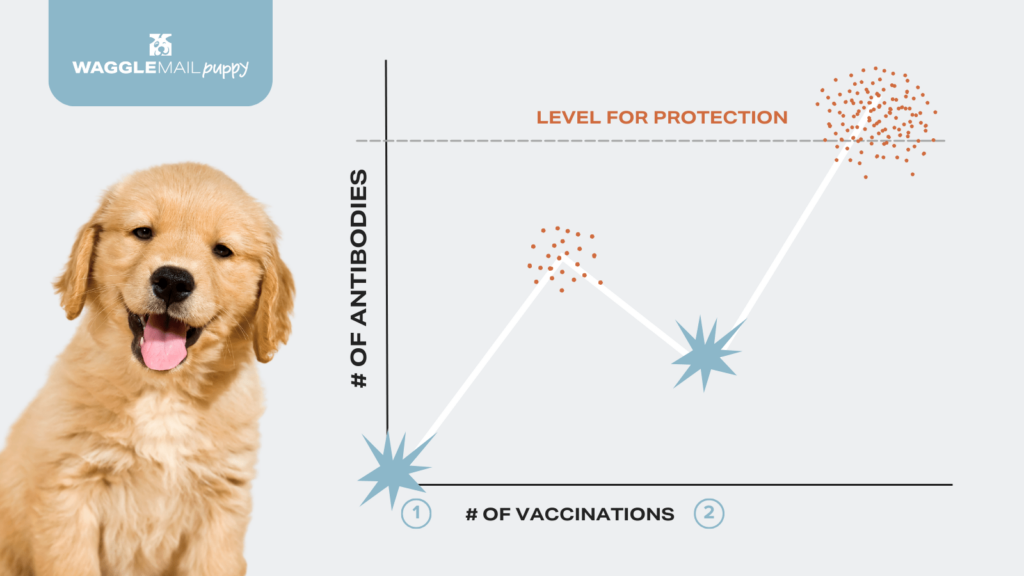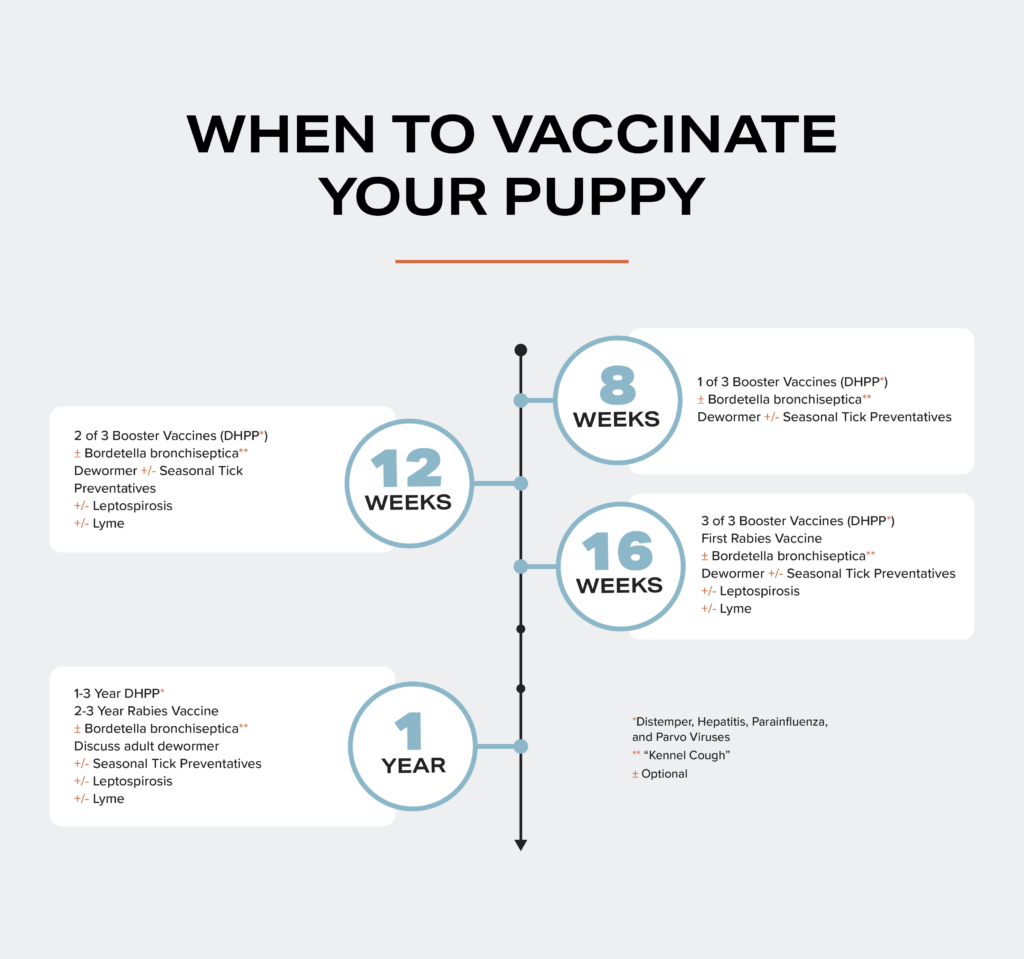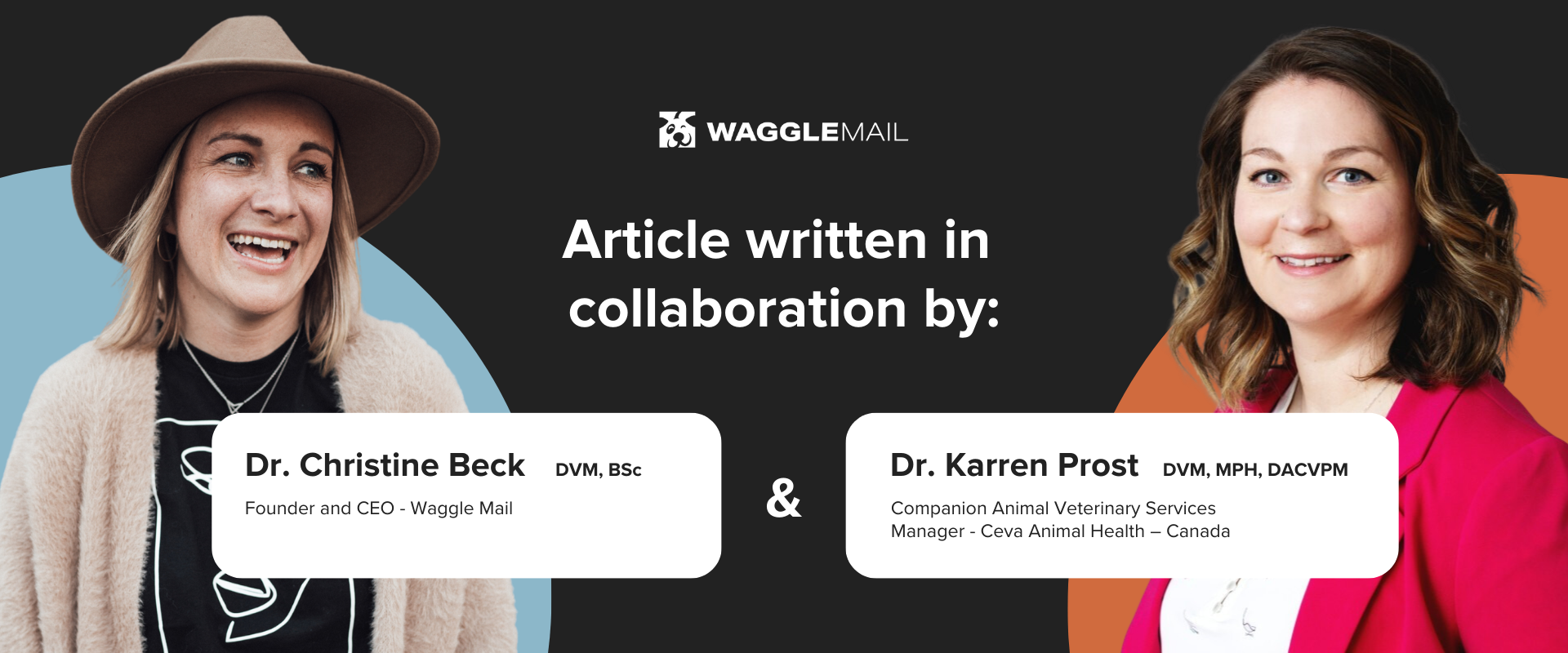Puppy Vaccination Schedule: when to get them and why
Before we dig into which puppy vaccinations your fearless fur-ball might need, it is important to know a little bit about the why. What puppy vaccination schedule is recommended to each unique pup will depend on factors like its mother’s vaccine history, potential future exposure to disease, geographical concerns, and other lifestyle or stress factors to consider. Don’t be surprised if your friend’s family vet in ON has a different recommendation than yours in SK – it comes with the territory – err province, literally.
Puppy vaccinations: why do they need them?
Just like with adult or senior dogs, vaccinations are an important component of your pup’s preventative medicine regime to help keep them happy and healthy. Puppy vaccinations are some of the most safest, effective and easiest ways to help protect your puppy against harmful, even potentially deadly, illnesses.
This protection can be two-fold, or even three-fold in its superhero abilities for shielding other animal members or human members in your household. Some viruses, like the rabies virus, can infect any warm-blooded animal or human and is a fatal neurological disease that is considered a zoonotic disease. Zoonoses are infectious diseases that can be transmitted between species, eg. dogs to humans or even humans to dogs. Because of responsible pet parent vaccination mandates in developed countries, luckily deadly viruses like rabies are quite rare. As per the World Health Organization, underdeveloped countries, on the other hand, unfortunately are not so lucky with dogs being the main worldwide source of infection for rabies in humans.
Jumpstart your puppy’s immune system
When a puppy is born, its immune system is not yet developed which means they are more susceptible to infections. The mother naturally produces a special milk called colostrum in the first few days after giving birth, which is rich in all the antibodies that the mom has to offer. Think of antibodies as little soldiers or immunity-producing proteins that fight off infections. These maternal antibodies have a short expiry date as they are only available to consume for just a few days before regular milk is produced and a puppy’s intestines undergo a process called closure. Closure is when puppies are no longer able to take externally produced antibodies into their systems. A well vaccinated, happily nursing, healthy mom’s maternal antibodies give puppies their best chance of an immune system jumpstart, for a few weeks to a few months, until their own systems can take over. This is where puppy vaccinations take the stage!
Puppy vaccination schedule: set your pup up for success
Puppy vaccinations allow your puppy to develop their own antibody army once their mom’s maternal antibodies have worn off. But here’s the tricky part: maternal antibodies against different diseases wear off after different lengths of time. Because of numerous studies, we do know that by 14-20 weeks of age, maternal antibodies are gone and the puppy must be able to thrive on its own immune system. This is why puppies need multiple sets of vaccines, or puppy boosters, at regular intervals in order to increase the chance of a good response to vaccines and to shorten their period of susceptibility to infections once the maternal antibodies have worn off.

How many vaccinations do puppies need?
Similarly to how each puppy vaccination schedule is recommended to each unique pup, the number of vaccinations needed will also differ between puppies. In general, some puppy vaccinations need to be repeated, (i.e. boostered) more than once or twice within a certain period of time in order to build enough of an antibody response to provide protection. Boosters are commonly done in 3-4 week periods in an effort to boost the amount of antibodies created by the first (or second) puppy vaccine before they taper off.

Ultimately, you and your veterinarian will work as a team to make a decision on the number of puppy vaccinations needed based on your puppy’s age, risk factors, and even geographical concerns as to where you live or where you might plan to travel to.
Puppy Vaccine Schedule Canada
The Canadian Veterinary Medical Association has published guidelines for vaccinations in Canada to help keep all of our beloved pets safe, just as the American Animal Hospital Association has done for our southern neighbours.

Dog Vaccinations: Core vs. Non-core vaccinations
You may or may not have heard your veterinary team talk about core vs. non-core dog vaccinations, and what that means for your own puppy vaccination schedule.
In general, dog vaccinations are considered core if they are recommended for all dogs, regardless of their age, lifestyle and where they live, unless there is a medical reason not to vaccinate. This classification is typically reserved for diseases that can make your dog or puppy significantly sick, and are present everywhere. In Canada some examples of core dog vaccinations include rabies or parvovirus.
Dog vaccinations are considered non-core if they are recommended for only some dogs based on their age, lifestyle or where they live. Contrary to core, these diseases are not necessarily always present or a dog’s lifestyle may not put them at risk of exposure. A perfect example of a non-core dog vaccination is kennel cough.
Kennel cough in dogs
Kennel cough is an infectious bronchitis characterized by a harsh, hacking cough that may or may not need treatment. An uncomplicated kennel cough in dogs typically runs its course within a couple of weeks, but in some cases it can progress to a life-threatening pneumonia. Lots of organisms, viral and bacterial in nature, can play a role in a case of kennel cough and some can be prevented by dog vaccinations. Bordetella bronchispetica is a common bacterial culprit, as well as viruses like parainfluenza, adenovirus, and canine distemper virus.
Discuss with your veterinarian whether kennel cough is recommended for your puppy, as this pathogen is spread through coughing and sneezing like the common human flu. If you plan on taking your puppy to puppy classes, groomers, boarding facilities, or eventually dog parks (once they are fully vaccinated), then it’s likely a good idea to have this non-core vaccination on board.
Can my puppy still get sick, even after receiving puppy vaccinations?
No vaccine out there is 100% effective, so in rare cases, vaccines can fail to induce appropriate protection against its attacker. You can increase the chance of vaccine effectiveness by following expert guidelines on vaccine protocols and by letting your licensed veterinarian administer them properly.
Here are a few reasons why puppy vaccinations might fail to protect:
- They were exposed to the infection before being fully vaccinated
- Your puppy still had maternal antibodies present at the time of vaccination, which interfered with their ability to mount a response
- In rare cases, your puppy may fail to mount an immune response to the vaccine, or as dogs get older they may mount less of an immune response to the vaccine.
- Improper storage, handling, or administration of the vaccine (which is why these should be done by licensed veterinarians)
What can I expect after my puppy gets a vaccine?
Immediately after a vaccine is given under the skin you might be able to feel a small “lump” where the liquid has accumulated in the fat. This typically goes away within a few hours, and in rare cases a bump might show up a few weeks later. If a lump persists past 3 weeks – give your vet a call.
Some vaccines, like kennel cough, might even be administered in places like their nose (yup – squirted straight into their nostrils). It is normal to sneeze or cough right after, but if it persists for longer than a few days – who you gunna call…ghostbusters! Or better yet, your vet.
Just like when you get poked in the arm with a vaccine, it is normal to be a little sore or tender in the area where the vaccine was administered for a day or so. If they seem uncomfortable, try applying a cool compress or ice pack for 10 minutes to help reduce the swelling and pain.
It is very typical for puppies to be tired or have a slight decrease in appetite for a day or two after getting puppy vaccinations. After all, it’s an exciting adventure going to the vet clinic with new sights and smells, and their immune system has been challenged to mount an antibody response. If they really aren’t themselves after the day after, let your vet know.
What are some signs that my puppy could be having a vaccine reaction?
If your puppy vomits or has diarrhea just once (without any blood) and is otherwise happy, alert, and still wanting to eat – close monitoring is an okay approach. If vomiting and/or diarrhea continues, or if your puppy’s face appears to be swelling on the way home – these could be signs that your puppy is having an allergic reaction and you should seek veterinary care immediately.
Even if you notice some minor reactions after your puppy gets their shots, you should always let your veterinarian know before or at the next vaccine appointment so they can help document any potential triggers and hopefully prevent it from happening again.
In conclusion, just like how each puppy vaccination schedule is curated towards every unique pup, so too are our vet-curated Waggle Mail Puppy packs. We do the research into trusted products and information so you don’t have to.


